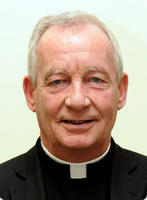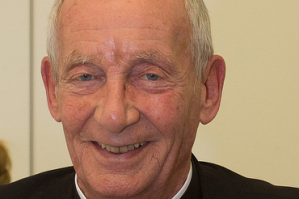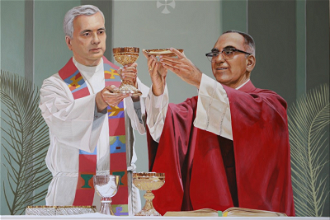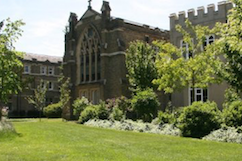Text: Archbishop Smith at Southwark J&P Assembly

Archbishop Peter Smith
Archbishop Peter Smith gave the following talk at the Archdiocese of Southwark Justice and Peace Autumn Assembly on Saturday, 16 October.
Last July, Paul Donovan, a journalist who writes for the Universe, wrote a pretty scathing criticism of the National Justice and Peace Network Conference, and expanded his remarks to include the work of Justice and Peace in the Dioceses of England and Wales. He asserted that the commitment at diocesan level has become “pretty sketchy with few dioceses having workers and some lacking commissions.”
He goes on to assert that CAFOD no longer gives the support it used to, whether financial or otherwise, to Justice and Peace work in the dioceses and offers as an example of what he calls a “more recent player” in the field, groups such as London Citizens which “has proved a good way of getting whole parishes and schools signed up to the work of social justice.” However, he says that “community organising is no better at providing a process for the formation of people. It targets people in parishes with control of the purse strings. Once signed up, a few people are selected for leadership sessions but the organisation as a whole operates in a very disciplined hierarchical way. Member schools and parishes are summoned to fill out big halls for assemblies that are incredibly stage managed affairs, with no questions from the floor allowed. Community organising is more of a method than a process. It was process and formation of people in the work of social justice that used to be so prevalent in justice and peace. This seems to have been lost.”
His conclusion is that the “The challenge for J&P is to get that process of formation back, that ability to analyse what is going on in the world and work out a process as to how to inculcate transformative kingdom values into that world. There is an urgent need for these formation processes to begin again at a number of levels. There is the challenge of getting more people involved. Then there is the challenge of how people are moved on once they become engaged. Many want quick fixes, rather than putting in the time, looking at the structural causes of the problems and acting. Work for social justice is a lifelong commitment not a quick fix. It is high time that the Church recognised this commitment and devoted some proper resources to the formation of communities steeped in social justice. At present this vital work is being too easily sidelined.”
Well, it was a pretty scathing criticism. Was he accurate? Was he right? Is J&P work being ‘sidelined’? Was he throwing down the gauntlet with a touch of hyperbole in order to help re-vitalise the Justice and Peace movement in England and Wales? I should be very interested to hear your comments on what Paul Donovan wrote, when we have the feedback and reactions later on this afternoon, but I want to give you my initial response now.
The challenge he presents in his conclusion I think is accurate: “The challenge for J&P is to get that process of formation back, that ability to analyse what is going on in the world and work out a process as to how to inculcate transformative kingdom values into that world.” He is not saying that the Church in England and Wales is not really involved in putting into effect in very practical ways, some of the key features and demands of Catholic Social Teaching. We all know, for example, of the great work of the SVP, of Catholic care homes, of prison visitors, of the thousands involved in caring for the sick, housebound and elderly and in healthcare especially in the NHS.
It seems to me he is asking us to consider what is the role and purpose if such groups and Commissions in the extremely complicated society and world in which we live; and to ask that question in the light of what has happened worldwide in terms of the financial crisis and economic recession with all the consequences which we are now just beginning to get to grips with. And to ask it in the context of what has been described as our “Broken Society”, the lack of trust in institutions, whether secular or religious, the seeming lack of sound moral and ethical underpinning of banking and financial services, and in the political system whether national or local, but exemplified particularly by the Parliamentary expenses scandal. The outrage at huge bonuses for some bankers and others even when some of them have not succeed but rather utterly failed in their enterprises – and yet are given huge sums when they step down and leave the mess behind for someone else to clear up! The billions paid out in welfare payments in many families in which there are now alleged to be three generations who have never worked at all. The growing gap between the rich and the poor; the fact that our prisons are overflowing; that Asbos appear to be pretty ineffective and so on and so on.
The issues of justice and peace and the environment are certainly essential elements in the broad panorama and very wide agenda of Catholic Social teaching. But in the light of what I have already said, it might be helpful just to spell out a little what Catholic Social Teaching is and what it is grounded in.
The Old Testament prophets, speak eloquently of what pleases God: not simply engagingin formal, ritual sacrifice, but in the breaking of unjust fetters, letting the oppressed go free, sheltering the homeless poor, sharing our bread with the hungry and clothing the naked. And God’s people are called to act with integrity in their dealings with each other so that their light will be a beacon within the community and a guide to right thinking and acting. In behaving in this way, the prophets assure the people that God will always be with them to guide them and bless them.
In his life, teaching and ministry, Jesus Christ made it clear to his disciples that he did notcome to abolish the law of the Old Testament but to fulfil it, and indeed to go beyond it. The Gospels reveal that he not only lived out those Old Testament values in his own life, but deepened and enhanced them. Truly blessed, he says, are those who are poor in spirit, those who are gentle, those who are merciful. Blessed are the peacemakers and those who hunger and thirst for what is right.
For us, and for all Christians, the basis and motivation of this moral life and our attitudes towards others is the unconditional love of God for all people, irrespective of race, colour creed or ability. This is the love with which God first loves us and which is revealed in human form in the person, teaching and ministry of Jesus Christ. When asked what the greatest commandment was, Jesus said that it was twofold: “You must love the Lord your God with your whole heart, strength and mind, and you must love your neighbour as yourself. What sort of love is Jesus speaking about, especially in terms of love of our neighbour? St. Paul very movingly draws out the meaning and consequences of that love in Chapter 13 of his First Letter to the Corinthians: “Love is always patient and kind; it is never jealous; love is never boastful or conceited; it is never rude or selfish; it does not take offence, and is not resentful. Love takes no pleasure in other people’s sins but delights in the truth; it is always ready to excuse, to trust, to hope, and to endure whatever comes.”
Living that Gospel imperative in our own time and in our own society and world is the basis and motivation of Catholic Social Teaching. We all have a duty, as citizens of all faiths and none, to engage appropriately and in accordance with our gifts and talents in political and public life, to promote the common good and do our best to help transform society for the better. I say that because, as Christians, we believe that every person has equal dignity in the eyes of God; a dignity which is God-given and is not grounded in any human quality or accomplishment, nor in race or gender, age or economic status. Despite differences of nationality, race or religion there is one human family and we are made for one another. We are not self- contained, isolated individuals. We are mutually dependent on one another as members of the society in which we live and by virtue of our common humanity.
If we fail to understand and promote that essential element of solidarity with one another, then society begins to break down in the pursuit of individual self-interest - and we can all think of examples of that breakdown in recent years. As we said in our pre- election document, ‘Choosing the Common Good’, the common good, on the other hand, serves human flourishing and promotes integral human development, and that requires “that people are rescued from every form of poverty, from hunger to illiteracy; it requires creating equal opportunities for education, creating a vision of true partnership and solidarity between peoples; it calls for active participation in economic and political processes and recognises that every human person is a spiritual being with instincts for love and truth and aspirations for happiness” and the exercise of responsible freedom in the service of truth and love.
Recognising our duty to the common good is also crucial if we are to address the deep and pervasive problem that rightly worries many: the need to build up trust in society – between individuals, between the citizen and the state, and in our institutions.
We all know that that trust has been severely eroded in recent years. However, if we go on down a path where we cannot believe anything good of anybody, we will ultimately create a world of individuals fighting for their own good at the expense of every other person. Society cannot change for the better without restoring trust in institutions, whether they be political, financial or ecclesiastical. Few need reminding of how major institutions have failed to live up to their calling. Members of Parliament have been pilloried for their use of expenses and allowances. Some Bankers have earned astonishing bonuses and brought the world economy close to collapse in the pursuit of ever greater profits. The Catholic Church too, in our country and in others, has had to learn some very painful and humiliating lessons in recent years in the way we have not dealt anything like adequately with the scandal of child abuse. And we too have come to understand only too well the damage inflicted when trust is betrayed.
Having said that, we all know from personal experience, the enormous value of individuals and especially leaders in public life who meet our needs with patience, compassion, skill and often great generosity. The challenge for society is to build up our structures and institutions so that they command the same respect and trust as the individuals who represent them best. We know it can be done, but it requires a new sense of service to others at the heart of our institutions.
Public life in Britain badly needs re-moralising and the injection into it of an element of sincere humility, if people are to regain faith in it. The restoration of trust in institutions, whether in politics or in business, places a particular responsibility on those in leadership roles. It is they who set the tone and help shape the culture of the institutions they lead. Over time leaders can wield immense influence, and carry a heavy responsibility to help bring about a real transformation by their vision and example. As Pope Benedict XVI has said: ‘development is impossible without upright men and women, without financiers and politicians whose consciences are finely attuned to the requirements of the common good ‘. (Caritas in Veritate 71). That demands the cultivation of moral character, the development of habits of behaviour which reflect a real respect for others and a desire to do good. Trust can only be earned and restored if the conduct of those in public office is plainly motivated by a sense of service to others, and if they accept that personal character and moral standards are as relevant to public life as they are to private life.
Catholic Social Teaching is the fruit of the Gospel imperative to love our neighbour as God has first loved us, that is, with an unconditional love. The implications of that are spelled out in the “Compendium of the Social Doctrine of the Church” which was published and launched in 2004. Speaking at the launch, Cardinal Martino said this: “The Compendium has a simple and straight-forward structure. . . three parts. The first . ..deals with the fundamental presuppositions of social doctrine -- God's plan of love for humanity and society, the Church's mission and the nature of social doctrine, the human person and human rights, and the principles and values of social doctrine. The second part . . . deals with the contents and classical themes of social doctrine -- the family, human work, economic life, the political community, the international community, the environment and peace. The third part . . . contains a series of recommendations for the use of social doctrine in the pastoral activity of the Church and in the life of Christians, above all the lay faithful.”
He went on to speak about the purpose and meaning of the Church’s social doctrine which, rooted in and based on the values of the Gospel, concerns “the construction, organization and functioning of society: political, economic and administrative duties, or duties of a secular nature that belong to the lay faithful in a particular way because of the secular nature of their state of life and vocation. By means of this responsibility, the laity put social doctrine into practice and fulfill the Church's secular mission.” Then he speaks of three challenges that face the Church in proposing and putting into effect her social teaching.
The first is the cultural challenge of “incarnating the eternal truth of the Gospel in the historical problems humanity must face. The truth of the Gospel needs to be brought into contact with the various branches of human knowledge because faith is not foreign to reason. The historical fruits of justice and peace develop when the light of the Gospel filters through and enters the fabric of human cultures, respecting the mutual autonomy of faith and knowledge, but also heeding their analogous connections. When dialogue with the various disciplines of knowledge draws the parties closer together and becomes productive, the Church’s social doctrine is able to fulfill its role of fostering the planning of new social, economic and political programmes, at the centre of which is the human person in all his dimensions.”
The second challenge arises from a broad ethical and religious indifference. “At the social level, the most important aspects of widespread indifference are the separation between ethics and politics and the conviction that ethical questions have no place in the public arena, that they cannot be the object of rational political debate, held as expressions of individual, even private, choices. By extension, the separation between ethics and politics tends to be applied as well to the relationship between politics and religion, which is assigned to the realm of private matters.” He also makes the point that this is a task that is more easily engaged in if it is undertaken in dialogue with other Christian Churches and denominations and with non-Christian religions.
Interreligious cooperation will be one of the paths of great strategic value for the good of humanity and decisive in the future of social doctrine. This is the area of peace and human rights; and it these areas of human rights, peace, social and economic justice,
and development that will be increasingly at the centre of interreligious dialogue.
The third challenge is what Cardinal Martino called “a properly pastoral challenge”. “The future of the Church’s social doctrine in the modern world will depend on the continually renewed understanding of this social doctrine as being rooted in the mission proper to the Church; of how this doctrine is born from the Word of God and from the living faith of the Church; of how it is an expression of the Church's service to the world, in which the salvation of Christ is to be proclaimed in word and deed. It depends on the renewed understanding, therefore, of how this doctrine is connected with all aspects of the Church's life and action.” It follows, therefore that the “Church’s social doctrine, which "is an essential part of the Christian message", must be known, propagated and lived.”
Pope Benedict, in his speeches and homilies during his visit in September confirmed all this, so I just want to quote part of the speech he gave in Westminster Hall, referring to the common good and the relationship between religion and reason. This is what he said: “I recall the figure of Saint Thomas More, the great English scholar and statesman, who is admired by believers and non-believers alike for the integrity with which he followed his conscience, even at the cost of displeasing the sovereign whose “good servant” he was, because he chose to serve God first. The dilemma which faced More in those difficult times, the perennial question of the relationship between what is owed to Caesar and what is owed to God, allows me the opportunity to reflect with you briefly on the proper place of religious belief within the political process.
This country’s Parliamentary tradition owes much to the national instinct for moderation, to the desire to achieve a genuine balance between the legitimate claims of government and the rights of those subject to it. While decisive steps have been taken at several points in your history to place limits on the exercise of power, the nation’s political institutions have been able to evolve with a remarkable degree of stability. In the process, Britain has emerged as a pluralist democracy which places great value on freedom of speech, freedom of political affiliation and respect for the rule of law, with a strong sense of the individual’s rights and duties, and of the equality of all citizens before the law. While couched in different language, Catholic social teaching has much in common with this approach, in its overriding concern to safeguard the unique dignity of every human person, created in the image and likeness of God, and in its emphasis on the duty of civil authority to foster the common good.
And yet the fundamental questions at stake in Thomas More’s trial continue to present themselves in ever-changing terms as new social conditions emerge. Each generation, as it seeks to advance the common good, must ask anew: what are the requirements that governments may reasonably impose upon citizens, and how far do they extend? By appeal to what authority can moral dilemmas be resolved? These questions take us directly to the ethical foundations of civil discourse. If the moral principles underpinning the democratic process are themselves determined by nothing more solid than social consensus, then the fragility of the process becomes all too evident - herein lies the real challenge for democracy.
The inadequacy of pragmatic, short-term solutions to complex social and ethical problems has been illustrated all too clearly by the recent global financial crisis. There is widespread agreement that the lack of a solid ethical foundation for economic activity has contributed to the grave difficulties now being experienced by millions of people throughout the world. Just as “every economic decision has a moral consequence” (Caritas in Veritate, 37), so too in the political field, the ethical dimension of policy has far-reaching consequences that no government can afford to ignore. A positive illustration of this is found in one of the British Parliament’s particularly notable achievements – the abolition of the slave trade. The campaign that led to this landmark legislation was built upon firm ethical principles, rooted in the natural law, and it has made a contribution to civilization of which this nation may be justly proud.
The central question at issue, then, is this: where is the ethical foundation for political choices to be found? The Catholic tradition maintains that the objective norms governing right action are accessible to reason, prescinding from the content of revelation. According to this understanding, the role of religion in political debate is not so much to supply these norms, as if they could not be known by non-believers – still less to propose concrete political solutions, which would lie altogether outside the competence of religion – but rather to help purify and shed light upon the application of reason to the discovery of objective moral principles. This “corrective” role of religion vis- à-vis reason is not always welcomed, though, partly because distorted forms of religion, such as sectarianism and fundamentalism, can be seen to create serious social problems themselves. And in their turn, these distortions of religion arise when insufficient attention is given to the purifying and structuring role of reason within religion.
It is a two-way process. Without the corrective supplied by religion, though, reason too can fall prey to distortions, as when it is manipulated by ideology, or applied in a partial way that fails to take full account of the dignity of the human person. Such misuse of reason, after all, was what gave rise to the slave trade in the first place and to many other social evils, not least the totalitarian ideologies of the twentieth century. This is why I would suggest that the world of reason and the world of faith – the world of secular rationality and the world of religious belief – need one another and should not be afraid to enter into a profound and ongoing dialogue, for the good of our civilization.”
What does all this mean for us? Well, to come back to Paul Donovan’s challenge which I mentioned at the beginning about how Justice and Peace groups can develop “the ability to analyse what is going on in the world and work out a process as to how to inculcate transformative kingdom values into that world.” So perhaps we might start thinking about and analysing the notion of “The Big Society” as put forward by David Cameron. In that, we have a bit of a head start because Philip Blond, a political philosopher whose thinking lies behind the idea, admits to having been influenced by Catholic Social Teaching. So here might be the basis of our involvement in the dialogue between faith and reason, in the light of the Gospel and Catholic Social Teaching, so that we can participate fully in promoting the Common Good in our time and in our society. The question I leave you with is this: how might we begin to go about that and encourage others to do the same?


















